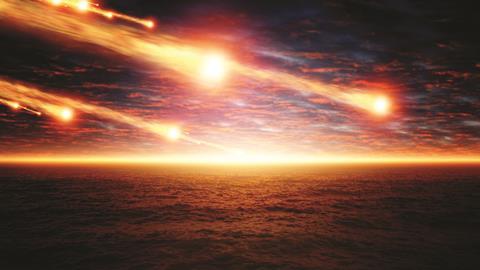It’s no longer just the Church that prophesies the end of the world; scientists, academics and journalists are also warning of existential threat. So how should Christians respond to widespread secular fears of Armageddon?
In January, the ‘Doomsday Clock’ – so-called because it reflects the likelihood of a human-made global catastrophe – was set to ‘90 seconds before midnight’, the closest it has ever been to annihilation since this metaphorical countdown began in 1947.
Anxieties about the Russian invasion of Ukraine and the ensuing proxy war between nuclear powers has resulted in widespread pessimism and fear of impending doom. Arriving on the coat-tails of a pandemic that wiped out millions, it’s little wonder existential angst is in the air.
The end is nigh
Proclaiming the end of the world has, in the past, been the preserve of the religious – the cliched street preacher wearing a sandwich board proclaiming: “Repent! The end is nigh.” (See also the runaway popularity of the Left Behind novels). There has been reams of speculation over the years as to whether various presidents or popes are the antichrist.
But imminent destruction is no longer a minority view. In fact, you could argue apocalyptic expectation has become more prevalent outside the Church than in it. In 2015, YouGov found that a quarter of people in the UK think the world will end within their lifetime – 37 per cent think it will be due to nuclear war, while 13 per cent said climate change will end life as we know it. The numbers will likely be higher today. In the United States, a 2022 Pew Research study showed 39 per cent of adults believed “we are living in the end times”.
Culture has both reflected and fuelled this foreboding in films such as Don’t Look Up, which imagines two astronomers trying to warn world leaders that a comet is about to hit the Earth. But while the number of people building bunkers in their back gardens remain low, some “survivalists”, as they’re known, are actively preparing for catastrophe by living off-grid and growing their own food.

Some speak of ‘the end’ as if it is inevitable, necessary or even desirable. “Where’s the asteroid?” is now a meme on social media, often posted in response to a new frontier in the rapid breakdown of social norms. For example, the week I was writing this article, it was a common response on social media to a number of bizarre happenings: from singer Sam Smith’s shockingly sexually explicit new music video to the proposal that brain-dead women on life support should be used as surrogate mothers. Related memes include: “Jesus. Put your sandals on and come down here. It’s an emergency.”
They’re meant to be funny, but such dark humour betrays a deep pessimism that the world we inhabit isn’t worth saving. Many people seem to be in agreement with the most gloomy of doom-mongers that the Church has produced through the ages. But why do we have this fixation on end times?
Bad news
According to research by Adam K Fetterman, a psychologist at the University of Houston, believing that the world will soon end is associated with threatening world events, as well as feelings of uncertainty, negative life experiences and lack of control.
A quarter of people in the UK think the world will end within their lifetime
We are subject to a barrage of negative news in the media, which can lead us to despair at the state of humankind. Every day we see stories of the most utterly revolting acts: from child abuse and torture to human trafficking. We want such atrocities to end and we are desperate for a better world; this is something we all share, Christian or not. Thoughts of Armageddon are perhaps an outlet for our common frustration.
End times through the ages
Early Church
In the early days of the Church, many Christians expected ‘the end’ to come at any moment, especially at times of great hardship and persecution (the sack of Rome in AD 410, for example). However, when their worst fears weren’t realised, apocalyptic beliefs lessened – until the next crisis.
Middle ages
The popularity of apocalyptic ideas waned when Christianity went mainstream post-Constantine, due to a more sceptical Augustine. However, in times of war and plague, understandably, people have been more keen to prophesy judgement and reckoning. The Black Death’s destruction of a third of the population of Europe in the 1340s prompted a zealous bout of religious speculation and anxiety.
Reformation
Martin Luther thought the end was nigh (though some begrudging Catholics believed he or his potential offspring were in fact the antichrist). Calvin was less certain. The upheavals that took place in Europe during this period still provoked plenty of speculation – not least by the famous occultist Nostradamus.
The age of reason?
With a more rational (allegedly) look at the Bible in the 19th century came a fashion to be more sceptical about our approaching doom. In 1925, German theologian Wilhelm Bousset said that belief in the antichrist “is now to be found only among the lower classes of the Christian community, among sects, eccentric individualists, and fanatics”.
20th-century evangelicals
Expectation of ‘the end’ was a significant part of 20th-century evangelicalism – from TV preacher Pat Robertson and his novel The End of the Age (Thomas Nelson) to the widely respected teaching of Billy Graham. However, the much-loved professor and New Testament scholar Tom Wright may be one the reasons why it has gone out of fashion. In his book Surprised by Hope (SPCK) he challenges the biblical basis for a lot of evangelical doom-mongering, and argues we should work for a better world rather than wishing it away.
Opportunity?
Some Christians might see the renewed secular interest in the apocalypse as an opportunity to warn others about the urgency of accepting Christ before he returns. It’s what those old sandwich boards warned, after all. It is even what Jesus seemed to say to his followers in the parable of the ten bridesmaids: “So you, too, must keep watch! For you do not know the day or hour of my return” (Matthew 25:13, NLT). Historically, the Church has upped its apocalyptic speculation at times of great difficulty, change and pain (see above box).
But if there is any temptation to gloat that the world accepts what Christians have been saying all along – resist. Any kind of apocalyptic event would involve desperate human suffering, and no one should want that, if they have any love in their hearts.
Being gleeful about a time of death and destruction isn’t a good look. After all, it’s what the producers of hit Channel 4 comedy Everyone Else Burns are currently lampooning – deluded religious folk salivating at the idea of all the “others” being destroyed.
The missing piece
There’s a very important difference between the world’s preoccupation with end times and the Christian concern. Christian apocalypticism is – or should be – hopeful. If we long for the end of this world, it should only be for one reason: because it will be the harbinger of a much better one, where God’s will is finally done in its perfect goodness and love.
Thoughts of Armageddon are perhaps an outlet for our common frustration with the revolting sin of the world
The secular world always misses this part of the story. When Hollywood, for example, borrows from the book of Revelation in depicting future tragedy, it creates a terrible dystopian future to be greatly feared. In doing so, it is missing the most glorious promises of a new heaven and new earth. Revelation 21:4 says: “He will wipe every tear from their eyes, and there will be no more death or sorrow or crying or pain. All these things are gone forever” (NLT).
No matter how terrible the times are or how real an existential threat may seem, the Bible promises that, eventually, good will triumph. “It is of course theoretically possible that the present world might be destroyed either by a nuclear disaster, a collision with a giant meteorite, or accelerating climate change,” New Testament expert Professor Tom Wright told Premier Christianity. “But the Christian, holding on to the resurrection of Jesus and the work of the Spirit, claims with Paul in Romans 8 that present troubles are to be seen as the birth pangs of the new world which God is making – to which, indeed, Jesus’ followers are expected to contribute through the prayers they offer as they are caught up in the same suffering.”
The apocalypse on screen

Threads (1984)
In the wake of the 1962 Cuban Missile Crisis and in the midst of the Cold War, atomic bombs were a real threat. This film depicted a horrifying nuclear winter in Sheffield, and it terrified TV viewers. The special effects – which were as sophisticated as tomato ketchup and Rice Crispies to depict third-degree radiation burns – nonetheless made their mark. Peter Bradshaw said in The Guardian that the TV show made him “break out in a cold, shivering sweat and kept me in that condition for 20 minutes, followed by weeks of depression and anxiety”.

The Day after Tomorrow (2004)
As fears over global warming advanced, Hollywood decided to up the drama: from people becoming instant popsicles due to sudden temperature drops of -150C to enormous tsunamis sweeping through New York City. Scientists frowned on the film’s sensationalism, but it was a box office smash.

Mad Max: Fury Road (2015)
Director George Miller described the key theme in Mad Max as survival – an attempt to retain humanity in the face of apocalyptic events. With the world a desert wasteland following societal collapse and warfare over resources, a survivor named Max Rockatansky is captured and imprisoned. The rest of the film covers his escape and the eventual overthrow of the violent despot responsible.

Don’t Look Up (2021)
This satirical take on modern political culture explores the lacklustre response to a looming comet that will destroy the earth. The comet – which is likely a metaphor for the threat of climate change or Covid-19 – provokes inertia, fake news and conspiracy theories. Until it’s too late.

Knock at the Cabin (2023)
This new and terrifying film borrows ideas from the book of Revelation but adds some pretty far-fetched details. God isn’t mentioned – the unseen force that unleashes devastation is assumed but not described. But why would it choose (spoiler alert) to make the world’s destruction dependent on a small family of two gay dads and their adopted child killing one of its own? Implausible but still chilling.
Glen Scrivener, an evangelist with Christian charity Speak Life, says that we must point to the light: “Our civilisation is headed towards a final reckoning. That’s a story we all recognise and resonate with. Into this mindset the Christian can say: ‘You’re right to rage against the dying of the light. The darkness does not win—the Light is most definitely brighter. And it will win out.’”
The sad and terrible things that happen in the world cannot snuff out the goodness and beauty that can be found
Such a bright hope is not just for our future – it’s for today. The sad and terrible things that happen in the world cannot snuff out the goodness and beauty that can be found, and the love and joy we can know in our hearts through our relationship with God and through genuine love for our fellow human beings. “The light shines in the darkness, and the darkness can never extinguish it”, John 1:5 (NLT) tells us. We can work to live this truth in our lives now, and in any difficulties that come.
Talking about ‘the end’ might draw a crowd, but without the firm hope of God’s brilliant new creation, it’s the equivalent of gawping at a car crash. Can we instead fill our minds and hearts with the goodness and beauty of the promised new world, and inspire others to come along with us? Rather than gawking at the carnage, the Church has the potential to be the emergency services.







































No comments yet